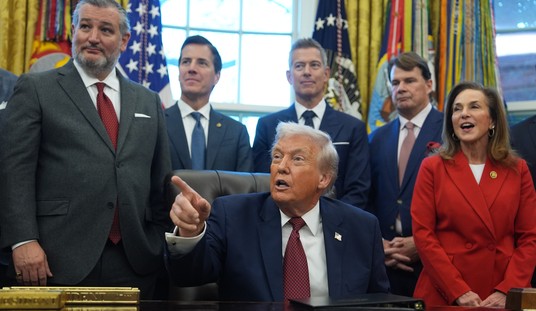Regardless of your perspective on the tactics and strategy employed by the various factions in the recent shutdown fight, I think all reasonable people will agree with one unassailable conclusion: We’d have gotten better results with more conservative Republicans holding office. Even the folks who roundly criticized Cruz, et al did so specifically because of their belief that Republicans had insufficient clout to have any realistic chance of achieving their desired goals. I don’t know of anyone on the Republican side who just didn’t think that fighting against Obamacare was a good idea on principle.
The reality is that the recent fight illustrated in a painful way the truism that elections have consequences. There’s a limit to what you can accomplish when you hold a slim majority of half of one of the major branches of the federal government, and that limit is not very high. At the very least we all agree it could be higher if conservatives were the majority of a GOP-led Senate (to say nothing of holding the Presidency). The problem we face is how we get from point A to point Z. Too many have taken the simplistic view that if Congress acts in more conservative ways, more conservative candidates will get elected. This ignores a number of facts about the way people actually vote.
Most importantly, voters vote for candidates, not issues. With very rare exceptions for extremely red states/districts, it is more important (for the voters who will decide these elections) to vote for a good candidate than to vote for someone who most closely meets the check box list of their issues. People still view their elected representatives as a reflection on them as a people and unless they live in Minnesota, they don’t like to be embarrassed by placing a perceived buffoon in a position of high authority. If a candidate cannot win the confidence of the electorate that he can do the job for which he is elected without making a fool of himself in the process, his chances of winning go down essentially.
As a corollary to this, blaming the media for unfairness is unhelpful. That is not to say that pointing out media bias shouldn’t be done – it should, because everything that diminishes the overall credibility of the Media Wing of the Democrat Party is a Good Thing – but long ago this tactic became a crutch to excuse poor performance of candidates who should have been better. Was the media unfair to Christine O’Donnell/Sharron Angle/Richard Mourdock/etc.? Sure. But what Republican does not understand by this point that the media has a vested interest in giving shaky Republican candidates a pass in the primary (especially against incumbents) only to savage them in the general? At this point, using media bias as an excuse for a politician not winning in a federal race is like a pro baseball player blaming gravity for not hitting more home runs. Media bias exists. It doesn’t look to be leaving us any time soon. In fact, it appears that it will be even more severe against conservative challengers than it has been against esablishment Republicans in the past. The answer to this is very simple: our candidates must be better. The answer is not to continue running ill-prepared candidates and blaming the media for their failure.
I submit that the TEA Party needs to do a fundamentally better job of identifying, preparing, and training candidates who can actually win elections and place conservative principles in the driver’s seat. This will not be an easy or quick process – an important thing to remember, as in my view too many TEA Party folks have fallen victim to believing in quick fixes for the problems that beset the federal government. But the reality (as demonstrated in 1994) is that identifying, training, and developing candidates who can win Federal elections takes time and effort.
- With rare exceptions, candidates for an office should be pulled from not more than one “level down.” This is to say, in an ideal world, candidates for Senate will come from the House, candidates for U.S. House will come from state legislatures, candidates from State Legislatures will come from city councils/school board, etc. Running for office is qualitatively different from any other endeavor. Furthermore, each rung up the ladder involves qualitatively different challenges, and tends to expose weaknesses that may have been heretofore hidden. This is particularly important in Senate races, which are prohibitively costly to contest and which can’t be undone for six years when a candidate flames out. Obviously, pulling from one level down does not ensure success, but it helps to minimize risk, and also protects otherwise talented candidates. As it is in sports and virtually every business endeavor, even the most talented person can fail and be ruined for years if they are pulled up too far, too fast. Who knows, for instance, what may have become of Sarah Palin’s career if she had not been subjected to insane and premature scrutiny, and had therefore been permitted to finish developing her chops over two full terms as Governor?
- This means, practically, that we need to do a better job of seeding lower electoral levels with scads of talented and principled conservatives. To draw from the sports analogy again, any GM will tell you that it’s impossible to predict with certainty which prospects will bloom and which will bust. The only way to protect yourself for the future is to load up on them. Conservatives are understandably focused on the federal government and what it does, as it tends to fuel the most attention (and, perversely, the most media coverage). But we’re holding too small of a rudder right now to make long-term changes to the direction of the federal behemoth – a significant portion of which is driven by state and local spending in any case. Victory must be achieved in the long game – start at the bottom, change the culture of elected legislatures, and work up. Conservative organizations need to be more prepared to engage in this long game by focusing on “lower” office holders and identifying and training them as they move up the chain, rather than plucking people off the street and using their plight as part of their own fundraising pitch.
- This also means that we need to do a better job of picking our battles. Just because an incumbent is terrible doesn’t mean we have the energy and resources to fight them. There are tons of terrible incumbents (both Republican and Democrat), as well as tons of open seats where the Establishment is trying to foist unnecessarily moderate candidates. Conservatives do not have the money, resources, and energy to fight effectively in all those races. What this means is, when we can’t find a credible candidate due to a thin in-state bench, we ought to be willing to move on to a different race where we can, rather than trying to force the issue with non-serious or unprepared candidates. Sometimes, in the course of doing this, we have not only lost important seats, but also damaged the brand of the movement itself.If we are going to start affecting real change and channeling the real and justified anger we have about the direction of the Federal government, we have to be willing to think in terms other than “Candidate X is bad, Candidate Y is not Candidate X, therefore we will support Candidate Y.” We did not reach this point overnight, and we won’t get back to where we need to go overnight either.















Join the conversation as a VIP Member